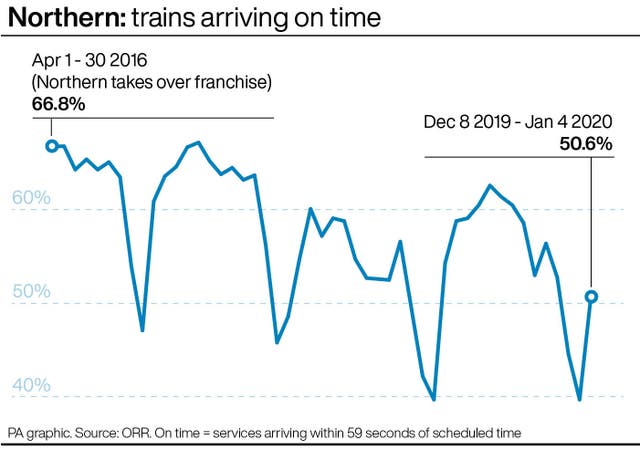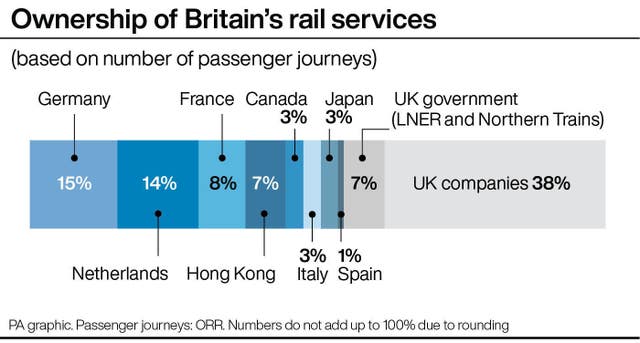Rebecca Long-Bailey has thrown down the gauntlet for other Labour leadership contenders to back a major re-nationalisation programme and commit to public ownership of key utilities.
Seen as a frontrunner to succeed Jeremy Corbyn, the shadow business secretary vowed on Wednesday night to “stand up to the rip-off privatisers” with plans to re-nationalise energy, water, rail and mail.
Her speech in Leeds came after she won the backing of the Fire Brigades Union to give her sufficient support to join Sir Keir Starmer and Lisa Nandy in the final round of the race.
The Salford and Eccles MP’s latest commitment makes her the most closely aligned with the outgoing leader, though she has sought to shake off the “continuity Corbyn” label.
Her opponents, Sir Keir, Ms Nandy and Emily Thornberry, have all indicated they would take more limited approaches to nationalisation.
In a pitch to the party’s left at a rally in Leeds, Ms Long-Bailey said she would “never give up” Labour’s commitment to public ownership.
“I want to be clear that I am fully committed to the pledges in our manifesto last year for public ownership of energy, water, rail and mail,” she said.
“Other candidates say they agree with the transformative programme, but now I’m calling for specific, concrete commitments you can trust.
“Public ownership of key utilities is the foundation for a more fair and equal society, and any candidate for Labour leader should endorse them without hesitation.
“Under my leadership Labour will stand up to the rip off privatisers, and bring wealth and power back into public hands.”
Other candidates’ positions on re-nationalisation
Ms Thornberry and Ms Nandy have both backed re-nationalising rail and mail, but stopped short of returning energy into public ownership.
Sir Keir has so far only committed to bringing back rail into public ownership, but is expected to revisit the issue later in the campaign.
“Keir supports expanding common ownership, whether by outright nationalisation or by other forms such as municipals, community organisations or co-operatives: all of which mean services are run for the public, not for shareholders,” a spokesman said.

Pleas to end rail franchising as nationalisation of Northern confirmed
Ministers faced calls to scrap the entire rail franchise system after finally confirming that services run by “failed” operator Northern were being brought under public control.
In a strongly-worded statement Transport Secretary Grant Shapps ended weeks of speculation, announcing that Germany-based Arriva was being stripped of the franchise on March 1 – five years early.
The Government-controlled Operator of Last Resort (OLR) will take over the franchise, under the name Northern Trains.
Manuel Cortes, general secretary of the TSSA transport union, welcomed the decision but urged the Government to accept that “franchising of our railways, while stuffing the mouths of shareholders with gold, has completely failed”.
Mick Cash, general secretary of the Rail, Maritime and Transport (RMT) union, predicted the action in relation to Northern will “open the floodgates” towards wholesale public ownership of the railways as other franchises will “fall like dominoes or simply choose to cut and run”.
Mr Shapps recently hauled the bosses of TransPennine Express in for an urgent meeting to discuss the company’s poor performance, while West Midlands mayor Andy Street has pledged to call for West Midlands Trains to be stripped of its franchise unless services improve.

In a written statement to Parliament, Mr Shapps acknowledged that his announcement “will inevitably raise questions about the future of rail privatisation”. He accepted that “change is needed” and claimed the Government-commissioned Rail Review led by former British Airways boss Keith Williams will “ensure customers are at the heart of the system”.

Industry figures show just 55% of Northern trains arrived at stations within one minute of the timetable in the 12 months to January 4, compared with the average across Britain of 65%.
Mr Shapps warned that some of the problems faced by the operator, such as “inadequate” infrastructure, will not be “quick and easy” to put right, but he wants passengers to see “real and tangible improvements” as soon as possible. Mr Shapps insisted that the only differences passengers should notice when the OLR takes over is “services gradually starting to get better”.
The OLR already runs trains on the East Coast Main Line under the LNER brand, following the failure of the Virgin Trains East Coast franchise.
Andy Burnham and Steve Rotheram, mayors of Greater Manchester and the Liverpool City Region respectively, said bringing services under public control was “a victory for passengers” but urged the Government to “commit to investing in much-needed rail infrastructure”.
READ MORE: Labour’s membership surges after election defeat, which report blames on Brexit

